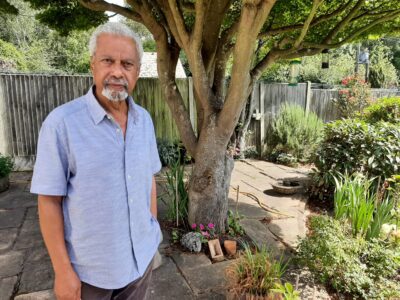Abdulrazak Gurnah
I interviewed the Nobel Prize winning novelist in August 2022 at his home in Canterbury. His novels draw the reader into the African experience of colonialism and into the complex lives of people who, through fate or by choice, live in one country but have roots in another.

"There’s a difference between remembering, which is an act – positive I should say, but a definite act, an act of trying to evoke and bring back – and memory which is irrepressible. You can’t do anything about it, it doesn’t go away. These are possibilities which are beautiful to explore for a writer."
"It is nothing new, of course, the idea of migrating in search of a better life. It’s a phenomenon that is with us all the time. It has been with us for centuries, it is just the direction of migration that is now different. Think about how many millions of Europeans have migrated out of Europe to other parts of the world – North America, South America, Africa, Australia and so on. And that has almost come to seem over the last three or so centuries as a kind of fact of life – something natural. The result of it is the displacement of people, in some cases the extinction of peoples. The only difference now, really, is that for the first time in the last fifty years of so, there have been migrations from the colonised world into Europe or into North America. And this has thrown many people in Europe into a panic."
I was commissioned to make Africký poutník (African Pilgrim), a documentary in Czech about Abdulrazak Gurnah and his work. He lives in Canterbury, the town where I was born and grew up, and it was at his home in a leafy suburb of the city that I met him on a hot summer day in August 2022. Canterbury is where he has spent the greater part of his adult life and where he set the novel Pilgrims Way (1988).
Abdulrazak Gurnah grew up on the island of Zanzibar but fled as an eighteen-year-old in 1966, after the island was engulfed in violence. The experience of exile and emigration recurs in his fiction; in the interview he talks about his novels By the Sea (2001) and The Last Gift (2011), and we discuss the deeply nuanced picture that they give of the role of memory and remembering in the experience of first and second generation refugees and migrants. The interview also turns to his two great novels of Africa, Paradise (1994) and Afterlives (2020), set before, during and after the First World War.
The programme I made for Czech Radio is in Czech, but I recorded my conversation with Abdulrazak Gurnah in English. Here it is: